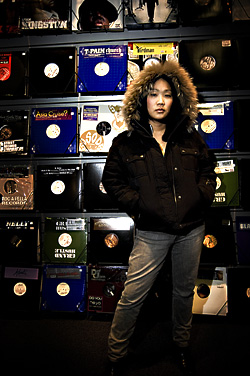Back in its heyday, Fifth Avenue venue I-Spy regularly featured rock and hip-hop acts. It has since disappeared and been replaced by retail and office space. DJ B-Girl refers to her opening for eccentric L.A. MC Busdriver at I-Spy as the gig that validated her presence in Seattle’s hip-hop scene. But her reference unintentionally dates her, considering the popular hangout closed back in 2003.
Breaking into music is harsh, unless you know somebody. DJ B-Girl (real name: Mia Beardsley) had a degree in audio engineering and recording when she moved to Seattle from Bellingham in 2001—but she knew close to nobody. It would be years before she networked with enough of the appropriate people and gained a business savvy about her.
As she stoically points out, “That’s why I’m sitting here talking to you right now…and I’m 31 years old.”
With three failed attempts to release albums in the past decade, it would’ve been easy for DJ B-Girl to fade into obscurity like many of the venues she’s performed at over the years. But earlier this year, DJ B-Girl released her first full-length album, Love or Fate, which helped create buzz about her talent with its slick production and exceptional track list. (Choice pick: “Murder She Wrote” featuring Sista Hailstorm and Julie C.)
“I feel like I can finally say that I’m a producer in Seattle,” DJ B-Girl tells me at Oseao Media Group, the digital music company she works for during the day and many of her evenings. “It feels like the dam that broke and released all the creative energy.”
DJ B-Girl lived with three roommates in the U District when she first came to the city. Money saved on rent went toward purchasing high-end tables and speakers to practice her craft. Days were spent working at Guitar Center, and nights were spent relentlessly pursuing gigs. She works more now than she did then, about 80 hours a week. Despite having a solid footing in the city’s hip-hop scene and her new album to support, she’s got another agenda to keep her preoccupied: helping other female artists find the connections she never had.
Last year, DJ B-Girl ensured she’d be getting even less sleep when she launched her own record label, B-Girl Media, and formed B-Girl Bench, a centralized forum (which meets at Oseao) for local women in hip-hop to meet weekly and research viable options to increase their visibility.
By drawing from her personal experiences and knowledge in digital distribution, DJ B-Girl hopes to help propel Seattle’s female hip-hop artists into the limelight. The greatest hurdle for many aspiring artists (including herself early on) is that they aren’t always well-versed in the business side of the music industry, she says.
“We have artists in Seattle who are talented enough that they should be getting national exposure—and they’re stuck at the regional level,” she notes. “How does that happen after they’ve put in 15–20 years of hard work? How can we help each other out and get to the next level?”
Two words: Media literacy. Rather than remaining passive, she says, artists must build their own momentum by understanding and using mass media to their advantage. B-Girl Bench participants, who include MCs like Julie C. and El Dia, help provide female artists with mentorship on finding promotion and performing opportunities, as well as access to different media outlets. Participants currently host Hip-Hop 101 on Seattle’s public-access television and often air on KBCS-FM (91.3), Bellevue Community College’s radio station.
“The key is to recognize women and the wealth of resources they hold,” DJ B-Girl says. “There’s strong leadership that’s scattered across the city, but we have a common goal and we need to come together. Cases in which an artist goes from the grassroots level to the national level are few and far between. We need to create a ladder for artists to climb toward that level. This is one of the steps.”
DJ B-Girl envisions the artists of B-Girl Bench (many of whom are on her label) touring at some point. She’d like to collaborate with women’s hip-hop organizations across the country and have Seattle artists performing nationwide several times a year. “My vision for B-Girl Media is to get artists as much media as possible while they still maintain their voice,” she says. “The industry tells you what to sound and look like; I want to have a label that reflects who the artists really are.”
By the time the complete B-Girl operation she envisions is up and running, DJ B-Girl could be in her 40s. She’s keenly aware of just how tough it will be to achieve her lofty plans and isn’t reveling in her success thus far. As she sums up in a voice both besieged and determined, “I’ve still got my work cut out for me.”





